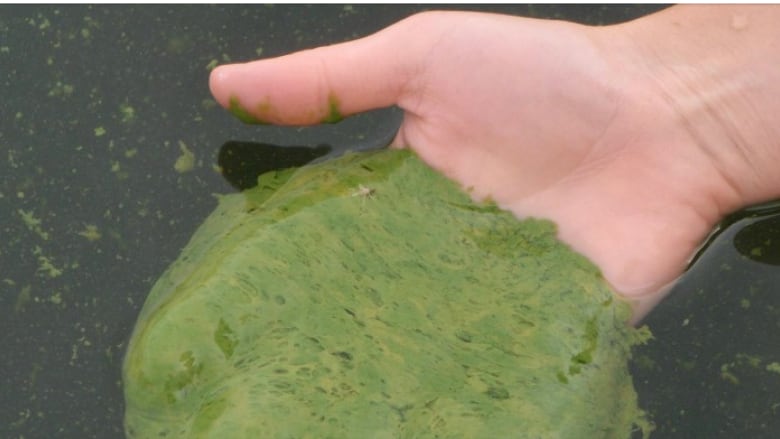'It's depressing': How blue green algae is taking over Alberta's lakes
'Once they really start taking ahold of the lake, they're really hard to get rid of'

An Edmonton conservationist fears the growth of blue green algae blooms will spell the ecological death of Alberta's lakes.
Rolf Vinebrooke, a professor of biological sciences at the University of Alberta, is warningthat Prairie lakes could become permanentlytoxic from blue-green algae contamination.
"Once they really start taking ahold of the lake, they're really hard to get rid of," Vinebrooke said in an interview with CBC Radio's Edmonton AM.
'You end up with a dead lake'
"At the end of the summer, when these blue-green outbreaks are dying off, that decomposition essentially causes the lake to become depleted of any oxygen. Any time something's rotting in a lake, it's going to consume oxygen.
"Then you start getting these major problems like massive fish kills and you end up with a dead lake that really isn't appealing to anyone."
Blue-green algae forms in water that is shallow, warm and slow-moving or still.
The scum, which can smell like musty rotten garbage, is driven by the presence of phosphorus and nitrogen. Once those nutrients are present, the water bodyremains contaminated for years, Vinebrooke said.
The algae-causing nutrients remain in the sediment, releasing fresh toxins every season.
"It's depressing because even if you could effectively turn off the phosphorus deposits into the lake, the phosphorus that's already been deposited into the lake over the last several decades, that essentially gets recycled," said Vinebrooke, who leads a research group responsible for monitoring outbreaks across the province.
"So if you turn off the phosphorus taps right now, you likely wouldn't see any real visible benefits for at least a couple of decades." Research by the University of Alberta suggests that blue-green algae, or cyanobacteria, is lurking in the waters of at least 246 water bodies in Canada.
There are currently five lakes under Alberta Health Services advisories in the Edmonton zone, and 33 province-wide.
The blooms can be triggered by sewage and septic fields and runoff from agricultural fields, lawns and livestock operations.
Blue-green algae ismore pronounced on the Prairies, where much of the soil is naturally phosphorus-rich.
Climate change has also contributed to its proliferation, said Vinebrooke.
"Alberta, as you probably imagine, is a pretty fertile landscape, so phosphorus is a naturally occurring element. It's quite abundant within the province," said Vinebrooke. "But the excess inputs from human uses is really the key element that regulates the growth of these things.
"They're basically microscopic little green plants living in the lake. If you fertilize it, give it enough light and then warm it up just like crops it will grow faster."
'There is a legacy effect'
Some toxins in blue-green algae can attack the liver or the nervous system, while others will only irritate the skin and eyes. If ingested, it can cause headaches, fever, diarrhea, abdominal pain, nausea and vomiting.
The algae can dramatically deplete alake's oxygenand produce toxins, resulting in massive fish kills.
It's aphenomenon which is likely to become more common if conservation efforts aren't taken seriously, Vinebrooke said. Communities and commercial operations need to ensure they aren't contributing to the problem.
"There is a legacy effect," he said.
"So even once you've cleaned up your act, the nutrients in the lake recirculate for a long time so you don't see any immediate benefits of being environmentally aware."












_(720p).jpg)


 OFFICIAL HD MUSIC VIDEO.jpg)
.jpg)



























































































